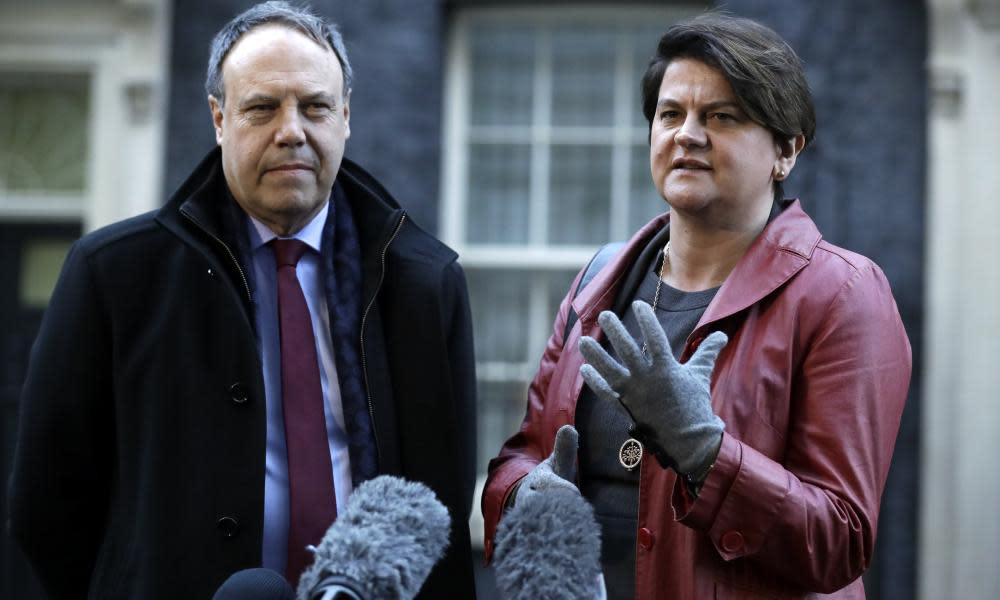Brexiters optimistic that May will stand firm on customs union

Brexiter Conservatives and the Democratic Unionist party emerged upbeat from their meetings with Theresa May in Downing Street, convinced that the prime minister was not intending to soften her position to try to attract Labour votes.
Those who met with the prime minister on Thursday said that she gave little away but that she indicated she wanted the UK to be able to strike its own trade deals after Brexit, meaning that she was not going to soften her stance on leaving the customs union.
A group of senior Brexiters – including former cabinet ministers David Davis, Iain Duncan Smith, Owen Paterson and Theresa Villiers – told May that parliament would back a deal if she could find a way of dealing with the Northern Ireland backstop issue.
Nigel Dodds, the DUP’s Westminster leader, struck a cautiously optimistic tone after meeting with May alongside the party’s leader Arlene Foster. May “has a way through this”, Dodds said, if she could ease concerns about the backstop.
None of the Conservatives who met with the prime minister wanted to comment publicly. One of those present said: “We were reassured on the concerns we had; she made clear that the option of trying to strike free trade deals was a condition of a deal.”
Others present at the meeting were Steve Baker, Mark Francois and John Whittingdale – while May was joined by Stephen Barclay, the Brexit secretary, and Julian Smith, the chief whip. Another MP who was there concluded: “She is not going to push this deal through on the back of Labour votes, that much is clear.”
A spokesman for May said that her meetings, that began on Wednesday night and continued throughout Thursday, would be approached “in a constructive spirit, and wanting to hear what the various groups have to say”.
But he ruled out making significant concessions: “Where people have pre-existing positions, of course they will want to make their argument for them, and the PM is going to listen, but you understand the principles which the PM holds, which she believes honour the result of the referendum.”
The prime minister also met with Green MP Caroline Lucas, on Thursday morning, after having met with Liberal Democrat leader Sir Vince Cable and the Scottish National party’s Westminster leader Ian Blackford on Wednesday night. All pressed for a second referendum, and extending article 50 to ensure that one could be held.
Friends of Lucas said that May pushed back on the idea of a second referendum, arguing it would “look bad for parliament if it could not fulfil this instruction of the British people”. The prime minister did ask for more information about the idea of holding a citizens’ assembly to debate Brexit.
Senior backbenchers from other parties held meetings with the Cabinet Office minister, David Lidington, and the environment secretary, Michael Gove, who is becoming an increasingly important figure as the Brexit impasse continues.
Several Labour MPs – including Hilary Benn, Yvette Cooper and Stephen Kinnock – met the two minsters, despite a plea from party leader Jeremy Corbyn to avoid meeting with ministers.
In a morning email to MPs Corbyn urged colleagues “to refrain from engagement with government until no deal is taken off the table”, a day after the Labour leader had said he would refuse to meet with May until she agreed to that condition.
May wrote to Corbyn on Thursday afternoon calling on him to reconsider, saying that the Labour leader had “always believed in the importance of dialogue in politics”. She asked: “Do you really believe that, as well as declining to meet for talks yourself, it is right to ask your MPs not to seek a solution with the government?”
Labour hit back, with a party spokesman saying: “As opposition MPs who have met with the government today have discovered, the prime minister is not yet prepared for serious talks to find a way forward.”
Lidington and Gove presented Lib Dem and Plaid Cymru MPs, including Tom Brake and Liz Saville-Roberts, with a one-page document that showed it would take longer than a year to organise a second referendum.
That is longer than the 22-week minimum set out in a report from the UCL Constitution Unit published last year, that took into account the time needed to legislate for one and organise the campaign.
Eloise Todd, the director of Best for Britain, a second referendum pressure group, said: “Europe has already said it would extend article 50 to accommodate a referendum, and after the snap election of 2017 it’s clear the country could move quickly to organise a people’s vote.”
May is expected to continue holding meetings on Friday, before heading to her country retreat at Chequers for the weekend.
May will on Friday come under further pressure from Boris Johnson to develop a domestic policy agenda to deal with the consequences of the Brexit vote.
Johnson will make a speech at the headquarters of digger maker JCB in Staffordshire, a firm owned by Tory donor Sir Anthony Bamford. Johnson will say that Brexit was “triggered by a feeling that in some way the people of this country has been drifting too far apart”.
The former foreign secretary will say that to “bring the nation together” the government needs to invest in “great public services and safer streets, better hospitals, better transport links and better housing”.

 Yahoo News
Yahoo News 
